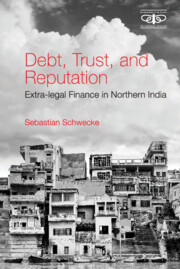5 - Trust
Published online by Cambridge University Press: 30 November 2021
Summary
The notion of ‘banker's trust’ has a paradoxical quality, like ‘burning cold’ or ‘military intelligence.’ Common sense (another paradoxical notion) tells us that bankers have no trust. Perhaps this explains the appeal of Marxist and Weberian assumptions that capitalist economies tend to destroy pre-capitalist social formations based on trust.
The designation of financial markets as M–M’ markets implicitly highlights the central role of trust in monetary transactions. Devoid of the commodity element in exchange of goods for money that accordingly expresses valuation differentials rather than assessments of uncertainty, financial markets engage in the transfer of money across time and space, extracting a commission for the necessary infrastructure, but especially for the uncertainty involved. Interest and collaterals, seen in this way, are functions of the level of trust employed. Regardless of its embeddedness in institutionalized or socio-cultural forms, assessment of uncertainty remains an individual process in that the party to a transaction needs to employ a variety of methods selected from the means available. Efforts to institutionalize the assessment of uncertainty as risk have taken a variety of forms, and typically several of these forms coexist, so that a historical analysis cannot describe successions of uncertainty assessing structures but merely point out prominently available methods and the gradual decline into obscurity of others. Yet, at all times, the individual needs to fall back on a variety of registers for handling uncertainty.
A significant part of the literature describing ‘modernization’ processes and the emergence of capitalist socio-economic orders deviates from this interpretation by describing a supersession of ‘traditional’ modes of assessing risks by ‘scientific’ or ‘rational’ ones, rather than changes in the patterns of coexisting registers. In accordance with the predominant strands of liberal thought at the time, the late colonial Indian state typically fell back on a ‘disenchantment’ or ‘rationalization’ trope when thinking in developmental terms, even though the literature on the ‘ethnographic’ colonial state provides ample evidence that its governing practices were informed by a much more pessimistic understanding of the unknowable qualities (for the British Indian administration) of the subjected population (see, for instance, Cohn 1996). The optimistic evaluation of the potentials of rationalization vied with more pessimistic perceptions of the possibilities of reform: optimism remained preeminent in guiding assumptions on the desirable outcomes, at the same time as the more pessimistic opinions framed responses that eventually marked the boundaries of where ‘progress’ was at all possible.
- Type
- Chapter
- Information
- Debt, Trust, and ReputationExtra-legal Finance in Northern India, pp. 157 - 200Publisher: Cambridge University PressPrint publication year: 2022

